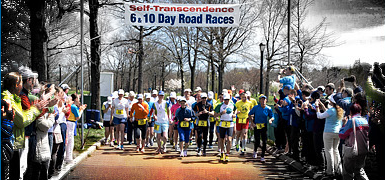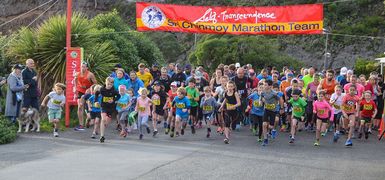2 weeks prior to a race:
· Avoid caffeine, diet sodas and alcohol.
· Maintain an adequate balance of electrolytes by taking in sports drinks as well as plain water for hydration.
· Increase fluid intake. Be sure that your urine is a light yellow.
· Slightly increase carbohydrates. Maintain a 60% carbohydrate / 40% protein ratio. Don't worry about a depletion / loading cycle.
· Don't try anything new in terms of diet or fluid intake.
· Be well rested. Getting a good night's sleep two nights before the race is more important than the night before the race.
Morning Of The Race
· Have your last meal 3 hours prior to the start: 75 - 100 grams of carbohydrates (complex carbohydrates / maltodextrins).
· Drink 10 - 12 ounces of fluid each hour during the 2 - 3 hours before your race, up to 30 minutes prior to the start.
Race / Workout - Fueling & Nutrition
· 15 minutes after you start, begin fueling. This helps your blood sugar and insulin levels adjust to your exercise.
· Maintain fluid intake throughout the race. Your body can absorb no more than 28 oz. / hour. Remember it's critical to supplement with electrolytes to avoid hyponatermia.
· Your body can absorb up to a maximum of 240 - 280 carbohydrate calories / hour into the energy cycle.
· Carbohydrates / complex sugars such as Maltodextrin (18 - 24% solution) are preferred because more calories pass into the blood faster than with simple sugars (6 - 8% solution). Studies have shown that simple sugars result in blood sugar levels below even fasting levels.
· For events longer than 1 hour, supplement with protein along with carbohydrates. Use a 1:4 ratio (p:c) to increase energy levels, and decrease muscle breakdown.
· Continue to supplement electrolytes, especially during hot and or humid weather. You should use a buffered electrolyte supplement containing sodium, potassium and magnesium.
Post-Workout / Race Nutrition
· Immediately begin to replenish fluids.
· Within 30 minutes of finishing, consume 10-20 grams of protein.
· Within 30 minutes of finishing, consume 250-350 calories of carbohydrates (or more). Research has shown there's a 2-hour window during which your body will absorb the protein and carbohydrates lost during exercise. The first 30 minutes of this window are the most critical. Your body will absorb 100% of the carbohydrates and proteins it needs during the first 30 minutes. The level of absorption decreases as the 2-hour window progresses.
Chill Out In An Ice Bath
Take an ice bath - from your hips down - after every hard workout, long run or race. This will reduce intra-muscular fluids and swelling and close down capillaries. It also reduces post-exercise soreness and eliminates delayed onset muscle soreness (DOMS). Fill the bathtub with enough water to cover you up to your naval, then dump in enough ice cubes to cover the bottom of the tub. Sit in the ice cold water for 10 minutes. Initially the shock of sitting in the cold water will take your breath away, but within a few minutes you'll become numb to the cold.
Training for and participating in an ultra-marathon can be an immensely satisfying experience that will give you a tremendous sense of accomplishment. If you trained adequately, maintained good nutritional habits and were physically and mentally prepared, your first ultra will be the precursor to many more!



